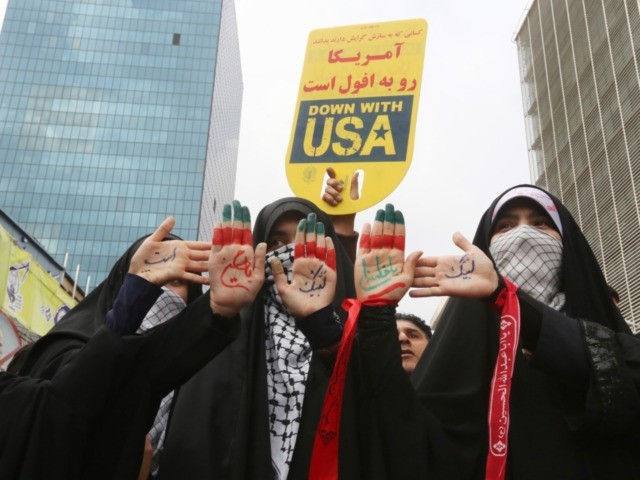Iran’s rubber-stamp parliament voted to expand an April 2019 bill declaring U.S. Central Command a terrorist organization to all of the Pentagon following the elimination of Iranian terror chief Qasem Soleimani. Iran’s Supreme National Security Council had also already branded the American armed forces a terrorist organization in April 2019.
An American airstrike ended Soleimani’s tenure last week at the head of the Islamic Revolutionary Guard Corps (IRGC) Quds Force, the special force tasked with terrorist activities to expand Iranian regime influence globally. President Donald Trump, Secretary of State Mike Pompeo, Vice President Mike Pence, and Pentagon leaders have issued consistent statements confirming that Soleimani was planning imminent attacks on American citizens.
Soleimani’s demise followed an attack on the U.S. Embassy in Baghdad, Iraq, last week, in which a pro-Iran mob attempted to storm the building. They failed, but not before leaving “Soleimani is our commander” spray-painted on the walls of the embassy.
Written on the wall of #US embassy in #Baghdad:
"People say no to America"
"Soleimani (Qasem Soleimani) is our commander" #Iran #Iraq pic.twitter.com/QT7zctQEWn— Nafiseh Kohnavard (@nafisehkBBC) January 2, 2020
Iran is currently in the middle of a mandatory three-day mourning session for Soleimani in which the regime forced so many people out on the streets that at least 35 died in a stampede on Tuesday. Iran’s parliament, which regularly chants “death to America” during its sessions, contributed to the occasion by branding via near-unanimous vote the “U.S. Army and the Pentagon as terrorist organizations in response to a recent move by Washington to assassinate revered commander, Lt. General Qassem Soleimani,” Iran’s Tasnim News Agency reported on Tuesday.
The bill, a revised version of the one passed in April, adds to the alleged terrorist list “all the members of Pentagon, the companies, and affiliated institutions, the commanders and those responsible for the martyrdom of … Qasem Soleimani.”
The revised bill will also result in 200 million Euros for the Quds Force to continue its terrorist activities in the wake of losing Soleimani.
“In order to shore the defensive capabilities of the Quds Force of the Islamic Revolutionary Guard Corps (IRGC), the government is obliged to provide 200 million euros from the National Development Fund to this force,” the April bill now reads.
Three of the 234 members of Iran’s parliament voted against the bill revisions.
Iranian state media has not specified at press time how the revisions to the April bill will affect the Pentagon or change policy, especially given that the Supreme National Security Council, the executive agency tasked with combating threats to the radical Islamic Iranian regime, had also already branded the United States military a terrorist group. Iran did not appear to significantly change its policy towards the United States in light of the designation, as Soleimani had spent years targeting and killing hundreds of American forces before April.
The national security council acted after President Donald Trump announced that the United States would designate the Islamic Revolutionary Guard Corps (IRGC) a foreign terrorist organization, the first time America had placed an official state entity on the list.
“This is the first time that the United States has designated a part of another government as an FTO. We’re doing it because the Iranian government’s use of terrorism as a tool of statecraft makes it fundamentally different from any other government,” Secretary of State Pompeo said at the time. Unlike the Iranian designations against the Pentagon, the American designations against the IRGC specifically targeted Iranian economic assets and ordered banks and other sources of funding to not cooperate with the IRGC, drying up funding for terrorist activity.
“This designation is a direct response to an outlaw regime and should surprise no one. It builds on the more than 970 entities and individuals that the Trump administration has already sanctioned,” Pompeo said in April.
Iran itself is on the State Department’s list of state sponsors of terrorism, considered the world’s most prolific entity with that title.
The IRGC is considered responsible – and several former members the subject of Interpol red notices, which request arrest – for the deadliest terrorist attack in the Western Hemisphere before September 11, 2001: the 1994 bombing of the Argentine-Israeli Mutual Association (AMIA) headquarters in Buenos Aires, which killed 85 people. Soleimani took over the Quds Force shortly after that attack. Intelligence indicates Soleimani was largely responsible for civilian attacks in Syria to keep dictator Bashar al-Assad in power; organizing Yemeni Houthi terrorist attacks against Saudi Arabia; emboldening Hezbollah in Lebanon; organizing attacks on U.S. forces through the Iran-backed Popular Mobilization Forces (PMF) in Iraq; and maintaining ties with the socialist regime of Nicolás Maduro in Venezuela.
Following the airstrike that exterminated him last week, President Trump stated it was necessary because of imminent threats to Americans, an assertion most of his administration has vocally supported. In a briefing yesterday, Defense Secretary Mark Esper noted that Soleimani had “been killing and attacking Americans for 20-something years and the blood is on his hands.”
“How do you expect us not to respond after they’ve been killing our people for 20 years? Soleimani alone has the blood of hundreds of Americans. He’s wounded thousands of Americans and coalition partners,” Esper emphasized.
Iran has responded to the strike by vowing to kill more Americans. Zeinab Soleimani, the terror chief’s daughter, said at his funeral on Monday that the families of American servicemen are now waiting for their loved ones to return in coffins thanks to “crazy Trump.” An unnamed speaker on Iranian state television attempted to crowdsource an $80 million bounty for Trump’s head, asking each Iranian for $1. State propaganda featured chants of “death to infidels” and, strangely, “death to al-Saud,” the Saudi royal family. There is no public information tying Saudi Arabia to the strike on Soleimani.
Follow Frances Martel on Facebook and Twitter.

COMMENTS
Please let us know if you're having issues with commenting.